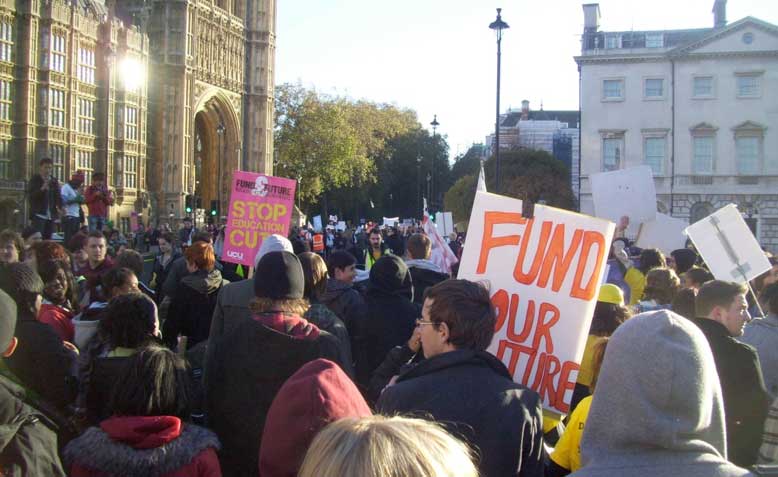 Student_protest_march_past_Houses_of_Parliament: Photo: Wikimedia Commons
Student_protest_march_past_Houses_of_Parliament: Photo: Wikimedia Commons
Those who claim protesting doesn’t work don’t understand what protest is for. We are building a movement for change, argues Clare Solomon
As students march this month against tuition fees and the marketisation of education it’s worth taking a quick glance at the impact of student actions.
Some claim protesting does nothing or, even more dramatically, as outlined in Student Revolt (2017 Pluto), Matt Myers’ new book on the student movement of 2010, claim that ‘the students lost’. I disagree with him on this, and we should remember what protesting is about.
Dictators
Of course we want to win immediate demands, but protesting is not just about reaching the finishing line of one particular campaign. It is about a process which builds people and our society up strong enough to take on the rich and powerful and their administering committee, the state, the police, the media, bureaucrats and the institutions built in order to promote the ideas of this ruling class. Leila Basmoudi opens her piece in my book, Springtime: the New Student Rebellions (Solomon & Palmieri 2011, Verso, p. 82), by stating that ‘dictators rarely relinquish power, they either die or have to be pushed aside’. The Tories are not dictators, but they will not step aside for us, so we must keep pushing, and eventually they will fall.
As 16 year old Stuart O’Reilly enthusiastically claimed, “protesting against tuition fees has not only allowed me to express my opinion, it has allowed me to grow up’… or as other 16 year olds say in this book “the recent rise in tuition fees has politicised a whole generation of young people…we aren’t prepared to just lie down and accept it’. Poignant comments from teenagers on their first demo in 2010 who have gone on to be involved in many campaigns and actions since.
Debates
Far from being ‘traumatised’ by a so called ‘failure’ this generation of people have, in fact, created an energy which sparked the current anti-austerity movement, increased confidence during workers’ struggles and have continued to organise huge demonstrations against war, islamophobia, Trump, including the magnificent Women Won’t Be Trumped marches against his foul sexism, and many more.
Similarly, many students involved in 2010 had also been involved in student occupations over the invasion of Gaza, had walked out as school students against Bush & Blair’s war in Iraq, had been on demos and engaged in debates and discussions in communities and workplaces.
Persistance
Reactions by the Right, such as kettling from the police and so on, have done little to quell the anger but have, rather, made those even only tangentially interested in protests be more resolute in their opposition to an unjust society. As Tunisian Poet El-Chebbi wrote: ‘he who cultivates thorns will reap wounds’.
So when we ask ‘what does protesting achieve?’ we must remember that the task of seriously changing society has never been a sprint but is a long term and permanent struggle to continue a red line of resistance. As the German left says, “Die letzte Schwacht Gewinnen Wir”.
Together in patient and persistent campaigns we will indeed win the last battle.

